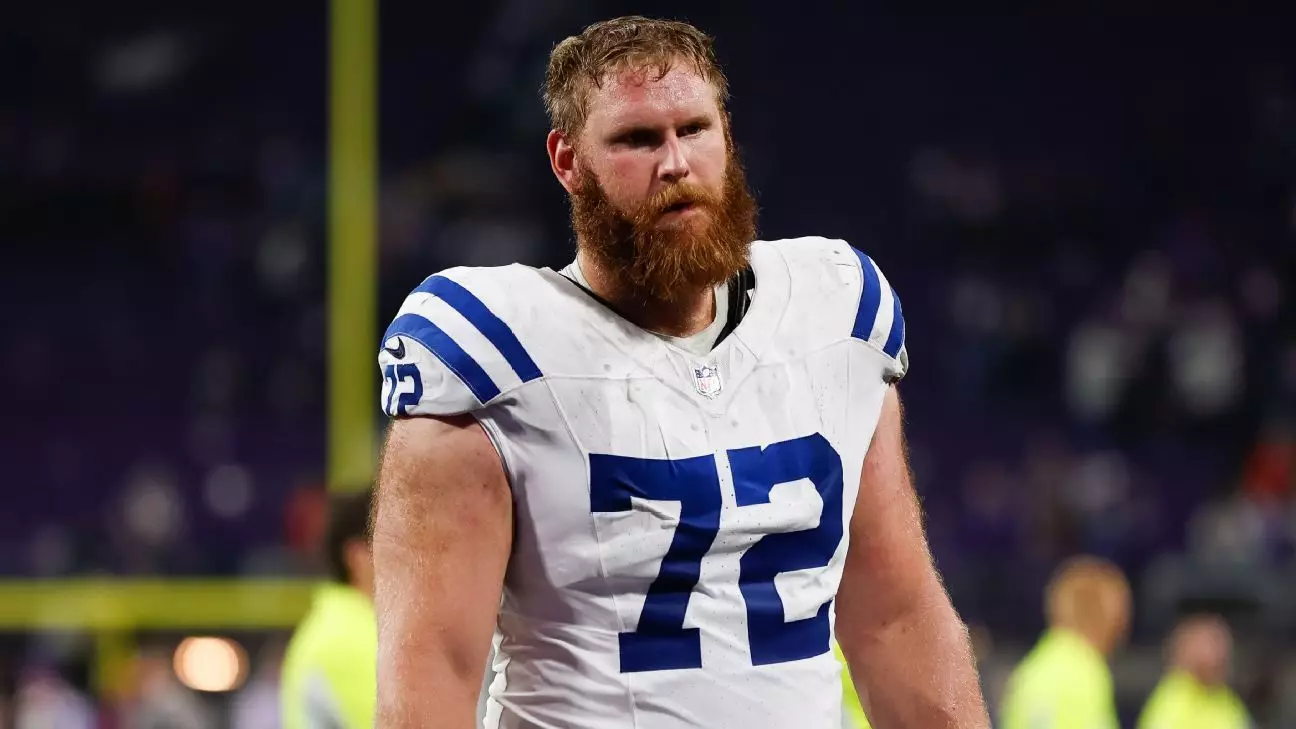In an environment where strength and resilience are often celebrated, the vulnerability of professional athletes can frequently be overlooked. Braden Smith, the Indianapolis Colts’ veteran offensive tackle, exemplifies this struggle. His admission of battling obsessive-compulsive disorder (OCD) reveals a deeply personal and challenging journey that goes beyond the football field. It serves as a sobering reminder that mental health issues can affect anyone, regardless of their status or perceived strength.
Smith’s experience, which led him to spend 48 days in a treatment facility, highlights the intense internal turmoil that often remains hidden behind the facade of athletic prowess. While fans cheer from the stands, they rarely grasp the weight of the personal struggles athletes carry with them, often exacerbated by the pressures of public life.
Understanding Religious Scrupulosity
Furthermore, Smith’s diagnosis of religious scrupulosity sheds light on a specific subtype of OCD that baffles many—tying deep-seated faith with anxiety. According to the International OCD Foundation, this condition manifests through obsessive thoughts about moral and spiritual failures, leading individuals to engage in compulsive behaviors to atone for perceived shortcomings. Smith’s personal struggle is a poignant illustration of how debilitating this disorder can be—when the drive to be perfect morphs into an exhausting cycle of guilt and anxiety.
“When you’re trying to live up to that standard, it’ll drive you nuts,” Smith remarked about the unrealistic expectations placed upon oneself. This insight does not merely resonate among athletes but extends to anyone feeling the weight of societal pressures—whether it’s in a professional capacity, personal life, or spiritual beliefs.
The Path to Healing
Smith’s narrative escalates when he discusses suicide contemplation, a reality that remains unspoken in many mental health discussions, particularly among men. This moment of severe distress embodies a crucial conversation about mental health: the importance of seeking help. Smith’s willingness to confront his adversities head-on is both inspiring and courageous, and reveals a multidimensional journey that involves traditional therapy and innovative treatments.
His subsequent decision to explore psychedelic treatment, specifically ibogaine therapy, further adds layers of complexity to his recovery story. While the legality of such treatments remains contentious, Smith’s experience highlights a growing interest in alternative therapies for mental health. His journey to Mexico for treatment not only represents an act of desperation but also a significant gamble on uncharted territory—a choice that many might hesitate to embrace.
After undergoing these radical therapeutic methods, Smith reflects on a newfound perspective regarding his mental well-being. “I don’t do compulsive prayers at all anymore,” he explained with relief. This simple yet profound freedom indicates a significant shift from relentless self-scrutiny to self-acceptance, showcasing the efficacy of his healing journey and outlining a path that many may learn from.
A Supportive Environment
The Indianapolis Colts organization clearly supports Smith’s recovery and recognizes his immense value to the team, and general manager Chris Ballard’s words of praise reflect this belief. “Braden Smith is back, and he’s in a great spot,” Ballard stated, highlighting the dual importance of not just physical talent but mental health as a cornerstone of an athlete’s performance. This level of organizational support can be a game changer for many whose struggles remain unacknowledged.
As Smith affirms his commitment to returning to the field and being the best version of himself, it’s essential to understand the environment that surrounds him. This support system isn’t just beneficial; it’s essential for athletes grappling with mental health challenges. The Colts’ acceptance of his restructured deal at $8 million speaks volumes about the robustness of team dynamics and the importance imparted by a culture of understanding—offering significant lessons for other organizations.
Renewed Purpose and Future Aspirations
Braden Smith’s desire to return to the game he loves serves as a testament to his resilience. He acknowledges that his physical presence last season was overshadowed by an emotional absence. His story is not just about returning to football but about reclaiming his life, family, and friendships in the process. This journey through the depths of despair to the heights of purpose is gripping and deserves recognition, not just in sports but across all domains of life.
With his journey unfolding, Smith is now poised to become a beacon of hope and change within the realm of mental health. His experience challenges the notion that strength must be silent, encouraging more athletes to speak openly about their struggles and advocate for mental health awareness. Through his actions, Smith is rewriting the narratives surrounding mental health in sports—transforming pain into advocacy and struggle into strength.

